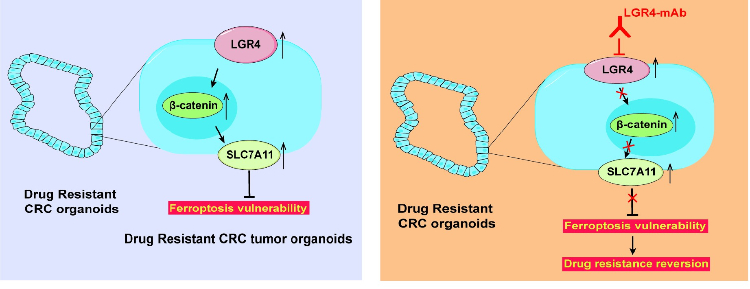A new mechanism of drug resistance in colorectal cancer has been discovered by the NKU team, along with potential targeted drugs to overcome multidrug resistance in tumors.
Colorectal cancer (CRC) is a prevalent malignant tumor of the digestive tract, and it is one of the leading cancers in terms of both incidence and mortality. Chemotherapy resistance presents a substantial challenge in cancer treatment and is a major contributor to treatment failure.
On January 30th, researchers led by Chen Quan from the College of Life Sciences at Nankai University, Du Lei from the Institute of Zoology at the Chinese Academy of Sciences, and Hu Gang from the School of Statistics and Data Science at Nankai University, published a paper titled Targeted activation of ferroptosis in colorectal cancer via LGR4 targeting overcomes acquired drug resistance in Nature Cancer. This study is the first to demonstrate the regulation of ferroptosis in cancer cells and tumor chemotherapy drug resistance through the LGR4/Wnt/β-catenin/SLC7A11 signaling pathway. The development of LGR4-mAb, a monoclonal antibody targeting drug-resistant CRC, has been successfully screened and prepared for potential clinical application in the treatment of CRC.
The study utilized tumor organoids obtained from CRC patients as samples. CRC organoids are a true reflection of the therapeutic effects on cancer patients undergoing clinical chemotherapy, and can be utilized as a tool for in vitro screening of anti-cancer drugs to predict tumor sensitivity to chemotherapeutic drugs. Additionally, low-concentration chemotherapeutic drugs were employed to induce the development of tumor-acquired drug-resistant organoids, enabling a comprehensive analysis of the underlying causes of primary and acquired drug resistance in tumors. Utilizing this model, the study demonstrated for the first time that the LGR4/Wnt/β-catenin signaling pathway confers resistance to ferroptosis in CRC cells by directly activating the transcription of the ferroptosis resistance gene SLC7A11. The elucidation of the drug resistance mechanism in this study, along with the development of the LGR4-mAb antibody, holds significant implications for the clinical treatment of CRC.

Chen Quan, a professor at the College of Life Sciences of Nankai University; Du Lei, an associate researcher at the Institute of Zoology, Chinese Academy of Sciences; and Hu Gang, a professor at the School of Statistics and Data Science of Nankai University, are the co-corresponding authors. Zheng Hao and Liu Jinming, who have graduated from Nankai University, and Cheng Qi, who has graduated from the Institute of Zoology of the Chinese Academy of Sciences, are the co-first authors.
Link: https://www.nature.com/articles/s43018-023-00715-8
(Edited and translated by Nankai News Team.)









